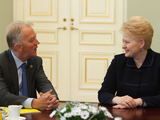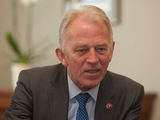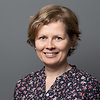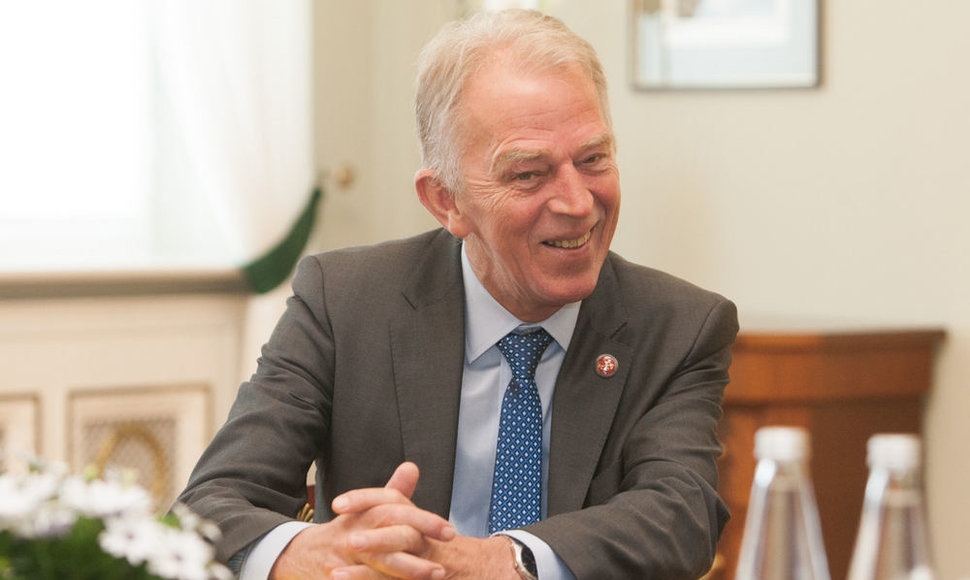Denmark presided over the European Union last year. On the eve of his visit to Lithuania, Søvndal spoke to 15min about challenges of EU presidency as well as the LGBT Pride that is to take place in Vilnius on the same month that Lithuania takes its place at the helm of the EU. Moreover, he shares the recipe of what makes Danes the happiest nation in the world.
- Lithuania will start its first EU presidency within less than 3 months. The most recent of Denmark's presidencies in 2012 was austere. What could you advise for Lithuania which has neither experience nor much money for a memorable chairmanship of the EU? What should we do so as not to fail but to be effective?
- First and foremost: Congratulations! Lithuania’s first Presidency of the EU marks a new phase in your European journey. I expect your Presidency will be a success.
 |
| Prezidentės spaudos tarnybos nuotr./Villy Søvndal and Dalia Grybauskaitė |
The Danish presidency of the EU last year took place under financial constraints. Our “recipe” for success was a clear focus on cost-effectiveness – giving priority to obtaining concrete results and by being an honest broker. We managed to organise a low-cost Presidency with a green trade mark – thus many journalists perceived it as being a “tap-water presidency”, which we took as a compliment. Drinking water from the tap in Denmark is healthy, saves money, and is good for the environment. A clear win-win.
- One of your ministers has compared the Presidency with rye bread which might be not very tasty and inspiring, but healthy. Denmark has presided over the EU seven times. Maybe ordinary people at home or abroad do not notice the Presidency, however, it gives a lot to the country itself, doesn't it?
- Actually, I think rye bread is both healthy, cheap and can be very tasty – it depends on how it is baked. Denmark took over the presidency precisely 40 years before Lithuania, on 1 July 1973. Denmark has held the presidency 7 times. Each time has been a new, challenging but enriching experience. And each time we have focused on creating concrete results to the benefit of the citizens of Europe.
What we refer to by talking about a rye bread presidency is the fact that today a presidency is not so much about the big summits as it used to be. You might remember how the enlargement of the EU was agreed in Copenhagen in 2002. Today a presidency is more about making the EU work. You need to take care of delicate negotiations within the Council and between the Council and the European Parliament. That is the main role of the presidency – more rye bread and tap-water than champagne.
- What results does the EU expect from the Lithuanian Presidency?
- The Lithuanian Presidency takes place at a difficult time. In light of the crisis, it is important to deliver concrete results through legislative decisions to the benefit of the European citizens and businesses. I think it will be important that the EU under the Lithuanian presidency continues to prove that Europe still works despite the debt crisis. The most important goal will be the creation of jobs and growth and I am sure that the Lithuanian Presidency will achieve substantial results in this regard.
- How do you assess bilateral relations with Lithuania especially in the fields of business, culture, art, education, personal relations? Where do you see any room for improvement?
 |
| Danijos užsienio reikalų ministras Villy Søvndalas |
- It is good to see how the ties between our two countries have been strengthened continuously since the early 1990s. Lithuania’s fight for freedom and your spirit to build a new society and economy after the regained independence impressed many Danes. I am proud that Denmark could be a partner in this process through an intensive cultural, educational and economic exchange. We will continue to give our relations high priority.
- The Nordic Countries are well known and praised for being among the most tollerant societies, whereas Lithuanians are often criticized for racism, antisemitism, homophobia, etc. The Lord Mayor of Copenhagen has even encouraged the Mayor of Vilnius not to throw sticks in the wheels of the Baltic Pride in July. How does Denmark see Lithuania in this regard?
- In a democratic society, respect for the freedom of expression and assembly is fundamental. This does not change, when minority groups - such as the gay community - want to make use of these rights. In fact, one could argue that the true watermark of a democracy is the protection of minorities and their rights to express themselves. Protection of demonstrators and crowd control are tricky issues, we know that from experience. None the less, it is important to tackle that issue too, when the pillars of democracy are at stake.
- Danes are constantly being ranked as one of the happiest nations in the world. What is your receipe of happiness?
- This is the ‘one million dollar question’ and of course not easy to answer as people’s happiness invariably is very individual in nature. Researchers point at some factors that may help explain why Danes are so happy.
At a national level, living in a wealthy, democratic country with an efficient and non-corrupt legal system and police force and with well-functioning political institutions probably provides a good framework for understanding the high level of happiness in Denmark. I believe that our wide social welfare system that provides equal opportunities is an important explanatory factor. We live in a country where people enjoy political freedom while at the same time also feel secure both legally and economically. The feeling of being in control of your own life often mentioned by Danes as an important facet of life may be associated with this overall society set up.
At a more personal level, research has shown that trust and confidence in other people are very important factors. Danes are world record holders when it comes to trusting others.
- Your country is also popular with students from Lithuania and other countries, you have a big community of immigrants. What attracts them and how do you manage to accommodate those coming to study, work, and live to Denmark?
- The high level of education combined with a friendly and relaxed learning environment where students and teachers debate openly during classes and lectures are some of the reasons for the popularity of Denmark as a study destination.
The fact that most Danes speak fluent English often makes the language barriers more than manageable.
In recent years, the social as well as the career dimension of being an international student has received increased attention. Thus a large part of institutions of higher education now have students’, alumni and buddy associations, as well as career counseling.













